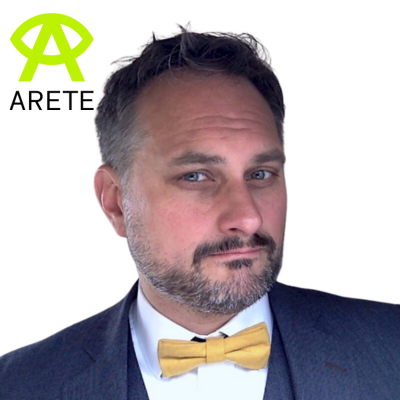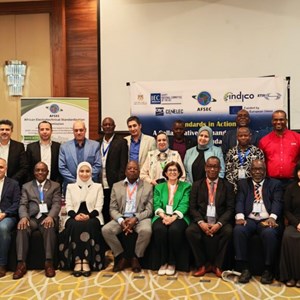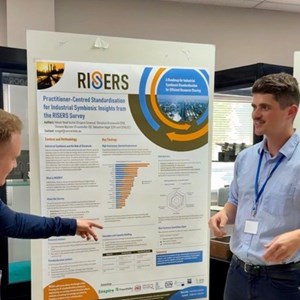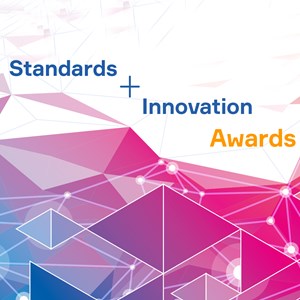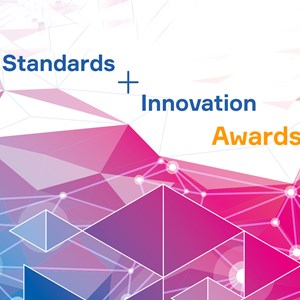The CEN and CENELEC Standards+Innovation Awards acknowledge and celebrate the important contributions of Researchers, Innovators and Entrepreneurs to Standardization. On 26 October, for its fifth edition, we will host the 2023 Awards Ceremony.
Approaching the event, we conducted a series of interviews with the winners of last year’s edition, to better know them and understand how winning the award has impacted their career.
For this episode, we interview Fridolin WILD, representative of the ARETE Project, winner in 2022 for the Category ‘Projects’.
1. Please, present yourself.
I am a full professor at the Open University’s Institute of Education Technology, where I overlook research on what I call ‘performance augmentation’: we look into how to use Augmented and Extended Reality technologies in support of guiding humans to high level of performance.
2. Can you please describe the ARETE project? What are its objectives and results?
As Confucius said: “tell me and I forget, show me and I will remember, involve me and I will understand”.
This is underlying the idea of the ARETE (Augmented reality interactive educational system) research project: with the new AR technologies we have an opportunity to make learning more exciting and engaging. Through the project, we want to make use of these technologies and develop them, to be able to apply them in educational and academic contexts.
Overall, in ARETE we set out to build the next generation of AR educational tool. To do this, we invested a lot of time into understanding how content production works, and how we can conceptualise it and break it down, so that we can have executable content models, to make the entry barriers to the use of these technologies lower. To do that, we worked in a participatory way.
Naturally, this approach led us to work a lot with and on standardization: for example, we tried to develop the next generation of content module standards, for learning analytics, and for regulatory aspects. For us, the output of what we have been doing in our project has the potential to set standards for others.
3. ARETE has led to the publication of a new CEN Workshop, CWA 18006:2023 on ‘eXtended Reality for Learning and Performance Augmentation - Methodology, techniques, and data formats’. Can you explain how you transferred the knowledge developed by the project into this CWA?
It is rare in a project in the standards world to hit the ground running, but this is what we have done with ARETE! In a previous project, we had already worked pretty intensively on building content model standards within the IEEE: this has allowed us to level up with ARETE, dedicating more time to working together and moving beyond the existing fragmented ecosystem.
As a result, through the CWA we have developed a kind of ‘standard of standards’ proposal, or an outline of what such a standard would look like, that brings all different contributions together: it includes interoperability standards that are needed for technology to work, and it complements it with standards on the quality of use, regarding user experience, ethics and accessibility.
4. Do standards hinder or facilitate innovation? What are the benefits that they can bring to emerging technological fields?
The situation is more complex than just a black or white answer. I think rather that, in many respects, standards are a breeding ground for innovation. To innovate, you need to be at a certain point where you can innovate; if you are fighting other problems first, you cannot innovate. In this sense, standardization provides a breeding ground for innovation to happen.
Having said that, the other side of the medal is that standards are often a way for scaling out innovation: when you find an agreement in an industry that is large enough so that everybody can adopt it, standards are the right vehicle to push it forward and scale out that innovation to many and not leave it languish somewhere on the shelf.
5. What should be done to increase the link between standardization and the European research community?
I am actually quite proud of what we do with CEN and CENELEC, which differs from other standards bodies.
In particular, the fact that in CWAs there is a fast track for European research projects is a very important one. In many academic areas, one encounters what I would like to call the ‘not invented here syndrome’: we have developed an innovation by working together, in full collaboration among stakeholders. But once one moves out from research and into standardization, there is a whole new process to start again: one is typically confronted with a wider range of stakeholders, and there is a need to apply a 3-to-5 years time span.
On this, through Workshop Agreements, CEN and CENELEC are doing very right: they have an approach of considering previous work so it can be fast-tracked and published quickly, while also lifting it up to the public view where others can see it and be engaged.
Other challenges are however present, which have to do mainly with the resources needed to link research and standardization. Sometimes, it is a long and arduous road, and it can take longer than the foreseen three years to get a PhD or complete a research. To help us with the schedule, for our project, we brought in a Secretary from UNE, the Spanish Standardization Body, to help us with the standardization process. Having somebody from inside the standardization work helped us a lot: he paced us and pushed us to meet deadlines, guiding us through the complexities of the standardization process and the related documentation.
In any case, CEN and CENELEC should be very proud of two things: first, the CWA instrument, which is a vehicle that allows researchers to not restart the whole process again, and receive fast recognition while moving on with standardization. And second, the possibility to link in standards bodies, not as consortium partners, but in a different role: this was a great model for our work and I would advise to promote this opportunity more widely.
One thing that in other standard bodies works pretty well is horizon scanning: we have done that in the past, as part of some actions for the European Commission. There is potential that we are not fulfilling, and we could do more in research in collaboration with standardization, to understand what is coming and identify new areas of standardization.
I would like to conclude with a few words about the Horizon Standardization Booster (HSB). It is a fantastic initiative to be part of and it has been very useful.
6. What has happened in the past year? Has your involvement with and approach to standardization changed?
Since we received the award, we have drawn CWA 18006 to a close, and I am very proud that it has finally been published in June. We have also finalised the research work: during the final performance review of the project last April, the European Commission was amazed by the quality of the result and of our work. It was an important result thanks to an excellent research team. Now, on to the next big thing!
7. What message would you like to share with this year’s nominees?
I would like to thank you very much for your service, your time, ingenuity and sacrifice, for the benefit of the EU members, its associates and linked global initiatives. I am grateful for what you have done to move your free market one step ahead in the future. Do not forget to pause and celebrate what you have achieved!
